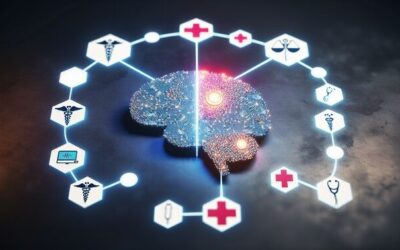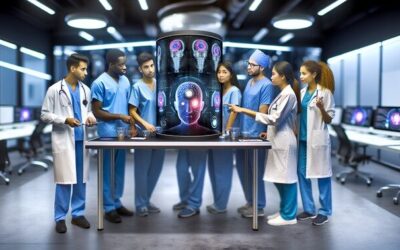Introduction to AI in Healthcare
Artificial Intelligence (AI) is revolutionizing healthcare by enhancing patient outcomes and streamlining operational efficiency. AI technologies such as machine learning and natural language processing are now being integrated into clinical workflows to provide more accurate diagnoses, personalized treatment plans, and improved patient monitoring. One significant application of AI in healthcare is its ability to analyze vast amounts of patient data for early detection of conditions such as heart disease and cancer. For instance, predictive analytics can identify at-risk patients by analyzing historical health data and current test results. A study in Nature highlighted how AI algorithms demonstrate greater accuracy than human clinicians in diagnosing certain diseases, leading to earlier and more effective interventions.
Moreover, AI is streamlining administrative tasks in healthcare facilities, reducing operational costs and freeing up staff to focus on patient care. Technologies that use machine learning to automate tasks such as appointment scheduling, billing, and patient follow-ups are being widely adopted. For example, hospitals using AI-driven management software reported up to 30% reductions in administrative workload, enabling healthcare professionals to devote more time to patient interactions [Source: Farmonaut]. These advancements illustrate the pivotal role of AI in making healthcare systems more efficient and responsive, ultimately leading to improved patient outcomes.
Enhancing Diagnostic Accuracy
AI has transformed the landscape of diagnostic accuracy through advanced machine learning algorithms and imaging technologies. These AI systems analyze vast amounts of data from various medical sources to identify patterns that may be undetectable by the human eye. For instance, machine learning techniques applied in diagnostic imaging can significantly enhance the precision of tools used for detecting conditions such as cancer, where speed and accuracy are critical. According to a study published in Nature, machine learning models are increasingly capable of outperforming traditional diagnostic methods, providing earlier and more accurate diagnoses across several diseases.
AI-driven imaging technologies, such as deep learning algorithms, are improving the interpretation of medical images. These algorithms can analyze data from MRI, CT scans, and X-rays at remarkable speeds and with precision, thus reducing the time required for diagnosis and increasing overall accuracy [Source: Nature]. Moreover, studies suggest that integrating AI into existing evaluation frameworks can lead to more personalized treatment plans and improved patient outcomes through tailored interventions.
With these advancements, healthcare providers can adopt data-driven decisions based on clear, actionable insights from AI systems. This shift towards technology-enabled diagnostics not only augments clinical capabilities but also enhances patient trust by improving the reliability of results and care effectiveness. Embracing AI in diagnostics signifies a robust evolution towards precision medicine, marking a pivotal change in healthcare delivery and disease management.
Personalized Treatment Plans
AI has significantly changed the approach to personalized treatment plans in healthcare by leveraging vast datasets to deliver tailored therapies that enhance patient outcomes. Through machine learning algorithms, AI analyzes extensive patient data, including genetic information, medical histories, and lifestyle factors, allowing for customized treatment strategies. This approach identifies the most effective treatments while predicting potential side effects and optimizing medication dosages based on individual patient profiles.
For instance, AI applications in oncology utilize genomic sequencing data to personalize cancer treatments, matching patients with therapies that are more likely to be effective based on the molecular characteristics of their tumors. Studies show that utilizing AI in this way can lead to improved survival rates and reduced costs by preventing unnecessary treatments. Additionally, AI can assist in real-time monitoring of patient responses to treatments, enabling adjustments that maximize efficacy and minimize adverse effects.
The integration of AI into personalized medicine is further enhanced by its ability to continuously learn and adapt from new data. As treatment outcomes are collected and analyzed, AI algorithms refine their recommendations, resulting in a dynamic treatment plan that evolves with patient needs. Research indicates that AI-driven personalized treatment plans have the potential to improve adherence to therapies, increase patient satisfaction, and ultimately lead to better health outcomes when compared to traditional, one-size-fits-all approaches [Source: Nature].
Streamlining Administrative Processes
The integration of artificial intelligence (AI) in healthcare administration is revolutionizing how medical facilities manage scheduling, billing, and record-keeping, significantly reducing administrative burdens. This technological shift not only streamlines operations but also enhances the overall quality of patient care.
AI-driven tools have demonstrated remarkable efficiency in automating scheduling processes, which traditionally required substantial manual input. For instance, AI systems can analyze patient data and preferences to optimize appointment bookings, minimizing scheduling conflicts and no-show rates. Research shows that practices utilizing AI for scheduling reduce the administrative workload by up to 30%, allowing healthcare professionals more time to engage directly with patients [Source: Health Affairs].
In the realm of billing, AI applications significantly enhance accuracy and speed, addressing the complexities associated with insurance claims and billing procedures. Automated systems can intelligently flag discrepancies and predict the likelihood of claim acceptance based on historical data, decreasing the time spent on billing disputes. A study indicated that healthcare organizations implementing AI-driven billing solutions saw a 20-30% increase in collections, which translates to improved revenue cycles [Source: McKinsey & Company].
Furthermore, AI’s role in electronic health record (EHR) management facilitates seamless data entry and retrieval, allowing real-time access to patient information. This accelerated access not only streamlines patient interactions but also empowers data-driven decision-making among healthcare providers. With AI, predictive analytics can provide insights into patient care, leading to tailored treatment plans and enhanced outcomes [Source: Forbes].
In summary, AI’s capability to automate administrative tasks in healthcare leads to significant time savings and improved efficiency, enabling medical professionals to devote more time to direct patient care. This ultimately enhances the patient experience and outcomes, highlighting the transformative power of AI in the healthcare sector.
Predictive Analytics for Better Outcomes
Predictive analytics powered by artificial intelligence is revolutionizing healthcare by enabling providers to anticipate patient health trends and outcomes effectively. This technology analyzes vast amounts of patient data, including electronic health records (EHRs), genetic information, and lifestyle indicators, to identify patterns that can signal future health events such as disease onset or hospitalization risks.
AI algorithms, particularly machine learning models, can process complex datasets to enhance diagnostic accuracy and personalize treatment plans. Such predictive models can predict health deterioration by identifying at-risk patients earlier, thereby facilitating timely interventions that improve health outcomes. For example, a study published in Nature demonstrated how machine learning could predict patient deterioration more accurately than traditional methods, enhancing clinical decision-making and patient management practices.
Moreover, predictive analytics in preventive care supports proactive strategies like vaccination drives and tailored screening programs. By identifying high-risk populations, these strategies can focus resources effectively, improving access to preventive care. According to experts, AI-driven insights can lead to a significant reduction in emergency care needs, fostering better healthcare delivery while reducing costs for healthcare systems overall [Source: Farmonaut].
In summary, embracing AI in predictive analytics not only enhances the quality of care through informed decision-making but also drives efficiencies across healthcare systems, positioning providers to respond effectively to patient needs.
AI in Drug Discovery and Development
Artificial Intelligence (AI) significantly enhances drug discovery and development, streamlining processes that have traditionally been time-consuming and costly. Researchers are leveraging AI technologies to identify potential drug candidates more efficiently. For instance, AI algorithms analyze extensive biological datasets to predict which compounds may interact effectively with targeted proteins, thus speeding up the initial screening process. Companies like Atomwise utilize deep learning to analyze chemical datasets and predict molecular interactions, potentially reducing drug discovery timelines from years to just months [Source: Nature].
Moreover, AI contributes to optimizing clinical trial designs by identifying suitable patient populations and predicting outcomes. By employing machine learning techniques, pharmaceutical companies can analyze patient data and historical trial results to determine the most effective trial protocols, which can lead to faster and more successful trials. This not only accelerates the time to market for new drugs but also minimizes wasted resources (up to 30% of spending is typically lost on late-stage clinical trial failures) [Source: Farmonaut].
AI’s impact extends into post-market drug monitoring, where it helps in analyzing real-world data to monitor drug safety and efficacy continuously. This application of AI is crucial for complying with regulatory requirements and ensuring patient safety [Source: Farmonaut]. Overall, the integration of AI in drug discovery not only streamlines the process but also paves the way for innovative treatments to reach patients faster and at reduced costs.
Ethical Considerations and Future Directions
The integration of artificial intelligence (AI) in healthcare presents significant ethical considerations, particularly in the realms of privacy, bias, and the future of medical technologies. One major concern is the handling of sensitive patient data. Healthcare systems that utilize AI must ensure robust data protection measures to safeguard patient privacy. Regulations such as the Health Insurance Portability and Accountability Act (HIPAA) in the United States set stringent guidelines on data security, but the rapid advance of AI often outpaces legislative frameworks, leading to potential breaches in confidentiality and unauthorized data access [Source: healthIT.gov].
In addition to privacy concerns, bias in AI algorithms poses a significant risk in healthcare applications. AI systems trained on non-representative datasets can perpetuate existing disparities and lead to inequalities in treatment access and outcomes. For example, studies have shown that certain AI predictive models can reflect and even exacerbate racial biases if the data used to train them lacks diversity [Source: National Institutes of Health]. Addressing this requires implementing inclusive training datasets and conducting regular audits of AI systems to ensure fairness across different demographic groups.
Looking to the future, AI technologies hold immense potential to revolutionize healthcare delivery. Innovations such as AI-driven diagnostics, personalized treatment plans, and predictive analytics can significantly enhance patient care and operational efficiency. However, these advancements must be approached with careful consideration of the ethical implications they entail. Establishing clear ethical guidelines, promoting transparency in AI algorithms, and fostering interdisciplinary collaboration between technologists, ethicists, and healthcare professionals will be crucial for navigating the complexities of AI in medicine [Source: World Health Organization].
As we continue to integrate AI into healthcare systems, addressing these ethical implications and aiming for inclusive, safety-conscious innovations will be fundamental in shaping a future where technology enhances rather than undermines patient care.
Sources
- Farmonaut – Top 5 Agriculture Management System Software Solutions 2025
- Farmonaut – Variable Rate Technology Agriculture 2025: Top 5 Trends
- Forbes – How AI Is Changing The Future Of Healthcare: 5 Applications You Need To Know
- Health Affairs – The Opportunities And Challenges Of AI In Healthcare
- healthIT.gov – What is the HIPAA Privacy Rule?
- McKinsey & Company – Healthcare Revenue Cycles: Where To Start Your Transformation
- Nature – Research Findings on AI and Diagnostics
- National Institutes of Health – AI in Healthcare: Challenges and Opportunities
- World Health Organization – Digital Health




